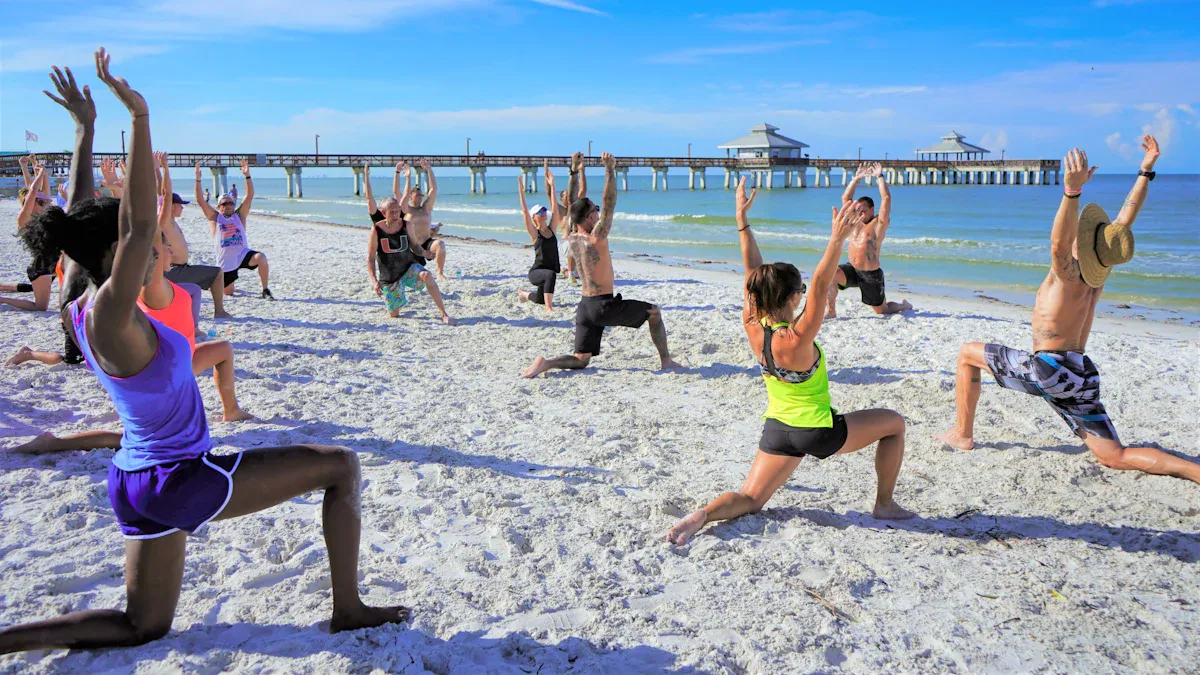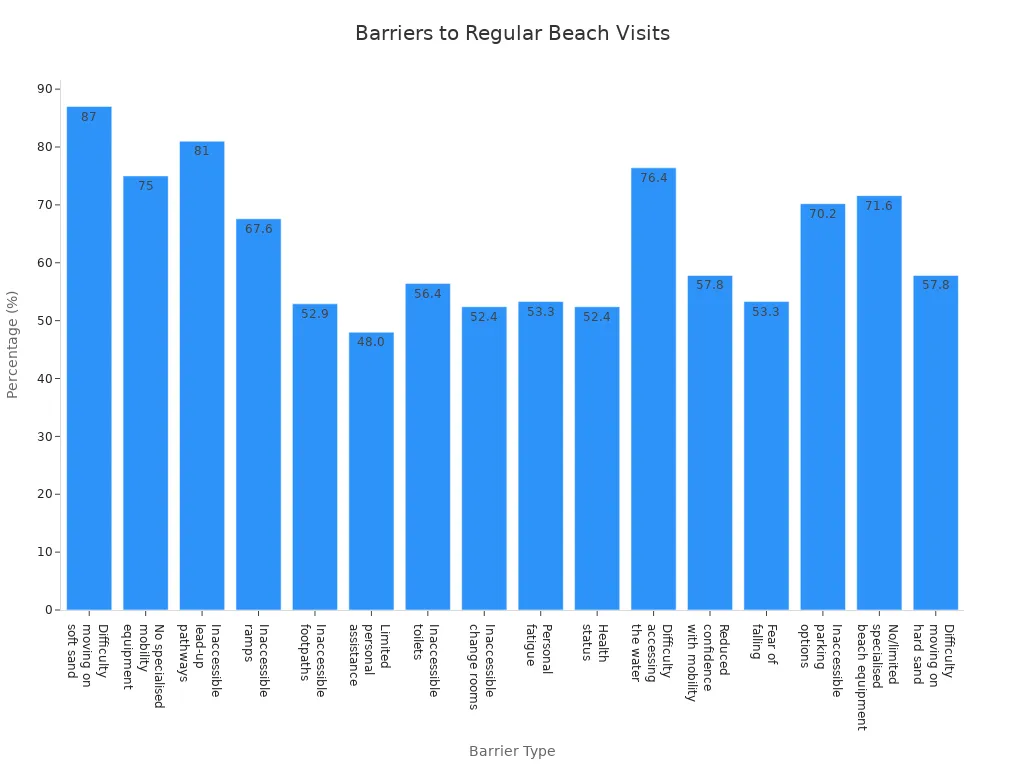You might feel better just by spending time at the beach. Many people report improved well-being after regular visits.
Over half of people who go to the coast once or twice a year say they notice Health Benefits.
Living near the seaside helps different age groups and backgrounds.
Age Group | Percentage of Beachgoers | Ethnicity Breakdown |
|---|---|---|
Under 20 | 33.6% | 59.5% White, 34.6% Hispanic |
30-49 | 33.4% | 65.4% Non-Hispanic |
Key Takeaways
Spending time at the beach can significantly reduce stress. The sound of waves and fresh sea air help calm your mind and body.
Regular beach visits improve sleep quality. Natural light helps regulate your internal clock, making it easier to fall asleep at night.
The beach provides essential vitamin D from sunlight, which supports bone health and boosts your immune system.
Stress Relief

Calming Effects
You know that feeling when you step onto the beach and take a deep breath? The air feels fresh, and the sound of waves fills your ears. Many people say their worries fade away as soon as they arrive. Research shows that beach environments help your body relax. Your breathing slows down, and your heart rate drops. You might notice your muscles loosen up as you walk along the shore or sit in the sand.
The rhythmic sound of ocean waves lowers cortisol levels, which helps you feel calm.
The gentle sea breeze and salt air add to the soothing effect.
Walking barefoot on the sand connects you to the Earth’s energy, which can reduce stress and inflammation.
The wide horizon and open sky at the beach make you feel free. You can look out at the water and let your mind wander. This sense of space helps you escape the stress of busy city life.
Mood Improvement
Spending time at the beach does more than just relax your body. It lifts your mood, too. Studies show that being near the ocean can lower stress hormones in just 20 minutes. You might feel happier and more positive after a walk by the water. Natural light, ocean air, and the sounds around you trigger your brain to release dopamine and endorphins. These chemicals help you feel refreshed and less anxious.
If you want to enjoy these Health Benefits, try listening to the waves or taking a stroll along the shore. Even a short visit can make a big difference in how you feel.
Improved Sleep
Natural Light
You might notice that you sleep better after a day at the beach. Sunlight plays a big role in helping your body know when to rest. When you spend time outside, your body gets signals from the bright light. These signals help set your internal clock, also called your circadian rhythm. Research shows that just 30 minutes of sunlight can make a big difference in how well you sleep at night. The beach gives you plenty of natural light, especially around midday. You can soak up the sun while you swim, play, or relax on the sand. This helps your body feel awake during the day and ready for sleep when night comes.
Tip: Try to spend time at the beach during the brightest part of the day. Your body will thank you later when you fall asleep faster.
Combating Insomnia
If you struggle to fall asleep, the beach might help. Evening walks along the shore can calm your mind and body. The gentle sound of waves and the cool breeze help you relax. Your muscles loosen up as you walk, and your thoughts slow down. Many people find that their sleep improves after a peaceful stroll by the water. You can make this a simple routine. Take a walk after dinner, listen to the ocean, and let your worries drift away. You may notice fewer restless nights and more deep sleep. The beach offers Health Benefits that go beyond fun and relaxation. Better sleep is one of the best gifts you can get from nature.
Vitamin D Health Benefits
Sun Exposure
When you spend time at the beach, your skin gets a boost of vitamin D from the sun. Your body uses sunlight to make vitamin D, which helps you feel strong and healthy. You only need about 10-15 minutes of sun on your arms and legs a few times a week to get almost all the vitamin D you need. The best time is during spring and summer when more skin is uncovered.
Here’s a quick look at how sun exposure helps:
Findings | Details |
|---|---|
UV Exposure Duration | 10-15 minutes of sun exposure can produce 1000 IU of vitamin D. |
Skin Coverage | 22% of skin uncovered is best for vitamin D synthesis in warmer months. |
You should remember that too much sun can hurt your skin. Try these tips to stay safe:
Use sunscreen with high SPF.
Wear a hat and light clothing.
Avoid staying in direct sunlight for too long.
Never let your skin burn.
If sunlight is weak, think about vitamin D supplements.
Bone Support
Vitamin D gives your bones the support they need. Without enough vitamin D, bones can become weak. Kids may get rickets, and adults can develop osteomalacia. Vitamin D also helps your immune system fight off sickness.
Role of Vitamin D | Evidence |
|---|---|
Bone Health | Vitamin D deficiency causes rickets in children and osteomalacia in adults. |
Immune System Function | Vitamin D is linked to immune regulation and may prevent autoimmune diseases. |
Active Form of Vitamin D | 1,25-dihydroxyvitamin D3 (calcitriol) is the active form necessary for its functions. |
You get these Health Benefits just by spending a little time at the beach. So, next time you visit, enjoy the sun safely and help your bones and immune system stay strong.
Skin and Circulation
Exfoliation
When you swim in the ocean, your skin gets a gentle scrub. The saltwater acts like a natural exfoliant. It lifts away dead skin cells and helps your skin feel smooth. You might notice that your skin looks brighter after a day at the beach. The sun opens up your pores, and the saltwater pulls out dirt and oil. This process can help prevent acne and dry patches. If you have rough spots on your elbows or knees, a swim in the sea can make them softer.
Saltwater removes dead skin cells.
It helps your skin absorb lotions and creams better.
Exfoliation from the ocean can reduce blemishes and extra oil.
Tip: Let the waves wash over your arms and legs. You will feel the difference right away!
Toxin Removal
The beach does more than just clean your skin. It also helps your body get rid of toxins. When you spend time in the sun, your pores open up. Saltwater then draws out impurities and helps your skin heal. People with skin problems like psoriasis often feel better after swimming in the sea. Saltwater has mild antibacterial and antifungal properties. It can help wounds heal faster and calm down red, inflamed skin.
Saltwater fights bacteria and fungus.
It helps your skin recover from cuts and scrapes.
The ocean boosts cell turnover, so new, healthy skin appears.
Beach activities like swimming, walking, or playing volleyball also get your blood moving. Good circulation brings more oxygen to your skin and muscles. You will feel more energized and refreshed. These Health Benefits make every beach visit a treat for your body.
Respiratory Health
Sea Air
You might notice that breathing feels easier when you visit the beach. The fresh sea air is different from the air in the city or at home. Ocean breezes carry tiny salt particles and ions that help clear your lungs. If you have asthma or other breathing problems, you may find relief just by spending time near the water.
For seniors with respiratory conditions like asthma or COPD, fresh sea air can provide relief and aid in easier breathing by clearing respiratory passages.
Ocean air serves as a tonic for the respiratory system, helping with lung diseases and sinus infections by reducing mucus formation, wheezing, and asthma symptoms.
A study in Australia tracked the effects of ocean air on surfers with cystic fibrosis, showing that salt air helped clear their lungs, reduced flare-ups, and decreased the need for antibiotics.
Ocean air contains negatively charged hydrogen ions that help absorb oxygen and balance serotonin levels, leading to increased energy and reduced depression.
The salty breeze from the Atlantic Ocean contains microscopic salt particles and ions that positively impact respiratory health, providing relief from respiratory conditions.
You might feel more energized and less tired after a day at the beach. The air helps your body absorb oxygen better, which can boost your mood and help you breathe deeply.
Sinus Relief
If you struggle with sinus problems, the beach can help you feel better. The salty air acts like a natural saline solution. It helps clear out your nose and sinuses, making it easier to breathe.
Saline solutions can enhance mucociliary clearance, which is crucial for relieving sinus issues.
In a study, patients with bacterial rhinosinusitis experienced faster symptom relief when using a saline solution compared to a control group.
Patients using a saline solution showed a reduction in the need for systemic medications for allergic rhinitis.
You might notice less stuffiness and pressure in your head after spending time by the ocean. The Health Benefits of sea air make every breath feel refreshing.
Physical Activity

You might think the beach is just for relaxing, but it’s also a great place to get moving. When you swim in the ocean, you use almost every muscle in your body. Swimming gives you a full-body workout and helps your heart stay strong. You can splash around, swim laps, or just float and kick your legs. Even a leisurely swim burns over 300 calories an hour. If you want to try something new, grab a boogie board or kayak. These activities work your arms and core while you have fun in the water.
Swimming
Swimming at the beach feels different from swimming in a pool. The waves make you work harder, so you build strength and endurance. You don’t need to be an expert swimmer to enjoy the water. Just moving around in the ocean helps tone your muscles and boosts your energy. Water aerobics and swimming laps can burn up to 600 calories an hour. You get exercise and enjoy the sunshine at the same time.
Tip: Always swim with a buddy and pay attention to lifeguard flags. Safety comes first!
Activity | Calories Burned (per hour) |
|---|---|
Leisurely Swimming | > 300 |
Kayaking | 272 |
Boogie Boarding | ~140 |
Beach Walks
Walking on sand is harder than walking on a sidewalk. Your feet sink in, so your legs and core work extra. A simple walk along the shore can burn more calories and help you feel stronger. At a pace of 3.5 mph, you can burn about 314 calories an hour. Short walks also lift your mood and clear your mind. You might notice you feel happier and less stressed after a stroll by the water.
Walking or running on sand engages more muscles.
Beach walks improve strength, endurance, and mental health.
Playing volleyball or paddleboarding adds even more fun and movement.
You get all these Health Benefits while enjoying the sights and sounds of the ocean. Next time you visit the beach, try swimming or walking to boost your fitness and feel great.
Pain Reduction
Muscle Relaxation
Have you ever felt sore after a long day? The beach can help your muscles relax in ways you might not expect. When you sit or lie on warm sand, the heat seeps into your body. This gentle warmth loosens tight muscles and eases joint pain. You may notice your back or legs feel less stiff after just a few minutes. Research shows that warm saltwater baths and hot sand treatments can make a big difference for people with muscle or joint problems. These natural therapies help reduce fatigue and promote relaxation. If you have trouble sleeping because of pain, spending time on the sand or in the water may help you rest better at night.
Tip: Try burying your feet or hands in the warm sand. You’ll feel the tension melt away!
Water Therapy
Swimming or floating in the ocean gives your body a break from gravity. The water supports your weight, so your joints and muscles don’t have to work as hard. This makes movement easier and less painful. Water therapy at the beach can improve pain, reduce tiredness, and boost your mood. Many people say they feel lighter and more comfortable after a swim.
Here’s a quick look at how water therapy compares to land-based exercises:
Aspect | Water Therapy | Land-Based Exercises |
|---|---|---|
Pain Improvement | Effective in improving pain | Varying effectiveness |
Fatigue Reduction | Improves fatigue levels | Mixed results |
Quality of Life | Enhances quality of life | Similar improvements |
Long-lasting Effects | Needs further study | Some studies show better outcomes |
You get these Health Benefits just by enjoying the beach. Next time you visit, let the sand and sea help your body feel better.
Social Connection
Group Activities
You never have to feel alone at the beach. The shore brings people together. You can join a game of beach volleyball or toss a frisbee with friends. Many people love group yoga sessions on the sand. You might see others building sandcastles or playing soccer. These activities help you meet new people and share laughs. When you join in, you feel like part of a team. You can even organize a beach cleanup with your neighbors. Working together for a good cause makes everyone feel proud.
Tip: Bring a ball or a kite next time you visit. Invite others to join your game. You might make a new friend!
Family Time
The beach is perfect for family fun. You can pack a picnic and eat together by the waves. Kids love searching for seashells or splashing in the shallow water. Parents can relax while watching their children play. You might build a giant sandcastle as a family project. These moments create memories that last a lifetime. Even a simple walk along the shore can bring everyone closer. The beach gives you a break from screens and busy schedules. You get to talk, laugh, and enjoy each other’s company.
Spending time at the beach strengthens your social bonds. You gain more than just relaxation—you enjoy real Health Benefits from connecting with others in a beautiful setting.
Mental Clarity
Ocean Sounds
Have you ever closed your eyes and listened to the waves? The sound of the ocean can help your mind feel clear and calm. You might notice your thoughts slow down as the waves roll in and out. Many people say that ocean sounds make them feel safe and relaxed.
Listening to wave sounds can lower your stress more than soothing music, according to a 2013 study.
People who hear rippling water often have the lowest cortisol levels, which means less stress.
Underwater soundscapes can reduce stress markers by 65% compared to silence or other nature sounds.
These sounds help your brain make alpha waves, which boost relaxation and creativity.
Ocean sounds have low frequency and a steady rhythm. Your brain sees this as a sign of safety, so your blood pressure drops.
When you hear the ocean, your brain releases dopamine and oxytocin. These chemicals help you feel happy and peaceful.
Next time you visit the beach, try sitting quietly and letting the sounds wash over you. You may find your mind feels clearer and your worries fade away.
Focus Boost
The beach does more than help you relax. It can also sharpen your focus. Studies show that spending time by the ocean helps you think better and solve problems faster. Researchers tested people on different tasks before and after they visited the beach. Most people did much better after being near the water.
Study | Cognitive Task | Result |
|---|---|---|
Bratman et al. (2015a) | Ospan | Significant performance improvement post exposure |
Berman et al. (2008) | ANT-E | Significant performance improvement post exposure |
Gamble et al. (2014) | ANT-E | Significant performance improvement post exposure |
Hartig et al. (2003) | NCPC | Significant performance improvement post exposure |
Greenwood and Gatersleben (2016) | NCPC | Significant performance improvement post exposure |
Chen et al. (2011) | Colored number pictures | Greater performance after viewing nature pictures compared to city pictures |
You can use these Health Benefits to help you study, work, or just clear your mind. A walk by the shore or a few minutes listening to the waves might be all you need to boost your brainpower.
You get so much from the beach—fun, stress relief, better sleep, and more. Families say everyone feels happier and closer after a visit. Try a walk, a swim, or just relax on the sand. Even short trips bring Health Benefits.
Bring water and healthy snacks.
Try new activities like yoga or paddleboarding.
Walk barefoot for grounding.

FAQ
Can you visit the beach if you have allergies?
You can visit the beach even with allergies. The sea air often feels cleaner and may help clear your nose. Always bring your allergy medicine.
How long should you stay at the beach for health benefits?
You get benefits from just 20 to 30 minutes. Try a short walk or sit by the water. Even quick visits help your mind and body.
What should you bring for a healthy beach day?
Pack water, sunscreen, a hat, and healthy snacks. Bring a towel and sunglasses. You stay safe and comfortable with these simple items.
